
ATV Company Profile
This article, which is of historical interest and is a large and important part of ITV history, was published in the Summer 1963 edition of ‘Contrast – The Television Quarterly,’ an independent critical magazine published by the British Film Institute. The writer is Wilfred Altman, a respected writer of television articles.
In its earlier years ATV acquired a reputation as the most picturesque and, some people suggested, the most pernicious of the ‘big four’ ITV companies. The feeling still persists, as was suggested in an article in Town in March of this year.
There always was the picaresque, if slightly comical, image of ATV’s top trio — Prince Littler, Val Parnell and Lew Grade — running the outfit just like another Palladium or Wood Green Empire show, with Norman Collins, who started it all, getting pushed more and more to the side-lines.
There were the trio’s smart early moves to dominate the network with cheap and often trivial filmed series and song and dance shows, which grabbed the high ratings. And Val’s imperious dismissals of programme criticisms simply as ‘sour grapes’ from critics employed by newspapers without a stake in ITV didn’t help; neither did the image of Lew as a tycoon with a predilection for Westerns, habitually riding two horses himself, as agent and employer.
And despite ATV’s first year’s loss of £600,000 (later made good by annual profits ten times as high), the impression has somehow got around of a contractor more grasping and profit-seeking than the rest.
This rough image is unfair. But neither the prestige of Norman Collins, nor the impact of a powerful PR outfit and a cohort of press officers adept at feeding gossip to the TV columnists has greatly changed it. Nor has the completely changed pattern of programming which has emerged in the last year or two.
Granada, which doesn’t mind cocking a snook at the press, has always managed to create a much better image of itself, mainly because one man displays care and concern about broadcasting and promotes the company’s serious work. There is no such clear demonstration of idealism at the top at ATV.
Yet, from whatever source the pressures stemmed — from producers and writers, Pilkington or the Programme Contractors Committee (ITCA), ATV has lately not been far behind Granada in innovation and pioneering. Its religious and schools programmes, for instance, and under Michael Redington, a steady stream of first-class documentaries, now supported by a contract to Television Reporters International.
Over the years there have been new lecture formats, like A. J. P. Taylor’s British Prime Ministers and Sir Kenneth Clark on art. Other achievements have included Right To Reply, The Four Freedoms, the annual As Others See Us discussions, the It Can Happen Tomorrow series, The Warning Voice and the brilliant On The Braden Beat.
The portrayal of store life at Harpers may be still less convincing than life at Gamma Garments (Coronation Street), but the glossed-up dramatised documentary approach (another ATV creation) of Probation Officer, Deadline Midnight and in the more recent Planemakers has brought a welcome new realism to soap opera repertoire. Spectaculars are fewer now (though the old Palladium show plods wearily on) and the number of mid-Atlantic filmed productions has diminished, but drama production has stepped up notably.
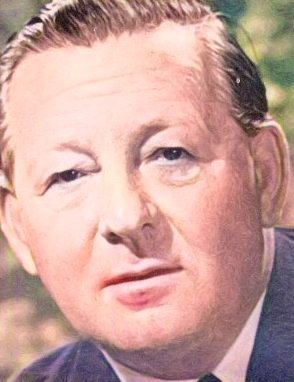
Sir Robert Renwick
With Val Parnell retired from his post of chief executive and Prince Littler replaced by Sir Robert Renwick, ATV’s hierarchy has a new face. Renwick, a tough and energetic stockbroker, who is also a pioneering technician with a passion for space communications, is very much in control, on the ’phone several times a day and at the office three or four times a week. As a passionate free enterpriser, who was once big (and liked) in London Electricity, but lost out to nationalisation, he fights tooth and nail for ITV — for a second channel, against the ‘encroachments’ proposed by Pilkington and the curbs and profit cuts planned by the Government. His influence in the Tory party, the City and the Institute of Directors probably makes him the most powerful campaigner in the whole of ITV.
At ATV he watches the profits, and, not being disposed to preside over the liquidation of its empire, supervises the expansion of its growing interests. Already close on 25 per cent of its profits come from outside investments — in Planned Music (Muzak), Pye Records, British Relay Wireless and radio and TV stations in Australia and Canada. Overseas sales by ATV’s production set-up, the Incorporated Television Company, accounts for over 10,000 hours of programmes, and its fully owned American subsidiary, Independent Television Corporation, has done ATV proud on US networks with series like Danger Man and Sir Francis Drake. The latest deal on the production export side, which isn’t likely to be affected by anything the Government can do to TV broadcasting, is a US-UK tie-up to produce the £1 million Espionage series, devised by the redoubtable Herb Brodkin.
While Sir Robert watches the profits, programming is in the hands of Lew Grade, who became a prototype of Val Parnell and succeeded him as managing director, has developed a close working partnership with Collins, with whom he discusses policy, programmes and problems every morning. 'We all need reassuring', he says 'I have Norman. Norman has Bob Renwick, who has us both!' He also listens to people like Bill Ward, the capable production controller, and to other producers of integrity and ability who care about quality programming.
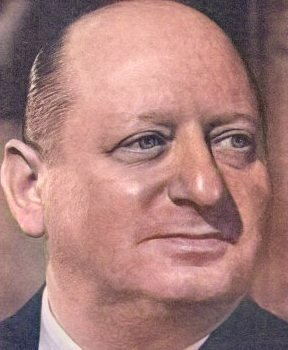
Lew Grade
Lew arrives at ATV House in his chauffeur-driven Rolls about 7.15. 'At 7.45 my Schedules Officer comes in, and at 8.00 mu Business Administrator. Between 8.20 and 8.45, when I call to see Norman, I’ve looked at our film material for the day and maybe called Howard Thomas or Sidney Bernstein at their homes. Once they’re in their offices, they’re in turmoil.’
What about ATV’s image of an essentially entertainment company? ‘People who think that,’ said Lew ‘don’t know our Midland programmes. In London we only have Saturdays and Sundays when people want to be entertained. But even at weekends we have educational programmes, documentaries and religion. So we do much more than entertain. We think this is our responsibility, but people want to relax too. Me, I watch every religious programme. I’m proud we were first to start weekly religious programmes. I watch them all and I’m interested, yet I’m a Jew. I’m proud of Emergency — Ward 10, praised widely by doctors and medical authorities. That’s the kind of achievement we work for, that makes us go on. It's not the money. Norman won’t mind me saying this, But he and I are adequately provided for our needs and our families. Money's no longer an incentive.'
Norman Collins, a novelist ('London Belongs to Me', etc.) one-time journalist, publisher, Chairman of the English Stage Society and former controller of BBC TV, overlords the serious side of the company's programming. The fact that Bob Heller was recently brought back into camp to do this suggests Collins is now more firmly in the saddle, as Deputy Chairman.
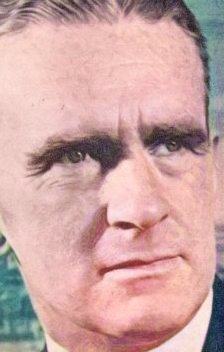
Norman Collins
He believes that the proportion of serious and frivolous programmes is about the same in at least three of the ITV companies. ‘We contribute more to the network — about 37 per cent — because we have the programmes.’ He is understandably proud of the new £4 million studios at Elstree. New programme ideas? ‘We think about them all the time. Few people realise how long it takes to get new ideas working and on the air.’ But there was no delay offering a contract to TRI, the ex-Panorama team. ‘They saw me about 4.30 on the day before I went on holiday. I discussed it with Lew and in a matter of hours told them to go ahead.’
ATV’s practice in the last year or two of appointing the best creative producers to administrative posts has caused some lifted eyebrows. Not all of them have an aptitude for executive functions. There’s always the danger of becoming too desk-bound on the one hand, or too involved in production on the other. Already one executive producer, Quentin Lawrence, has opted out of the job, back to drama production which he prefers. (‘I just don’t like a lot of budgets, in and out trays.”)
But the system works somehow. Michael Redington is clearly one example of an executive producer who thrives on wider responsibilities. Alan Tarrant, light entertainment, is another. Bill Ward, probably Britain’s most experienced TV producer (he pressed the button when the BBC transmitted the first TV show from Crystal Palace) deserves a great deal of the credit for selecting ATV’s producers and consistently maintaining the technical quality of the output. He conducts meetings with executive producers once a week to plan individual programmes, to decide who is to produce and direct them, to discuss schedules, ideas, artists, budgets and technical facilities.
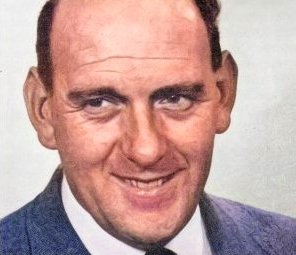
Bill Ward
‘Take a new series, Ghost Squad, for example, which returns in the autumn. The very first meetings are with Stella Richman, in charge of scripts, and Lew Greifer, who is under contract to us as drama consultant. We examine the past series, discuss overall production of the new series, the kind of writers required and who’s going to be executive producer. Stella and Lew get the writers to produce story lines. Having been chosen as executive producer, Dennis Vance collaborates with Lew to get the scripts written. We finalise a budget structure, production facilities and the cast.”
‘That’s just one programme. You've got to multiply this work several times, and add it to meetings with individual producers and directors, selection boards for trainee directors, the sieving through of masses of ideas, and a lot of advance planning, which is a problem because we’re only allowed to plan until next July. It’s a great help, mind you, to have everything under one roof here at Elstree’. Ward is helped through this work by a secretary and P.A. and an assistant productions controller, Harold Jamieson. (Jamieson is about to leave ATV).
He claims to get a fairly free hand, “Once programmes and series have been agreed at the top. I sieve the ideas which are finally put up and go over them with Lew Grade. Sometimes we have fierce arguments, but he will listen and sometimes change his mind.’
The only producer who also liaises direct with Lew Grade and Norman Collins is Michael Redington, who started his career as an actor, did two world tours with the Old Vic and got experience as a theatrical producer. At first he produced schools and religious programmes at ATV, then became responsible for the increasing volume of current affairs and documentary programmes, including The Braden Beat and I Want to Be...
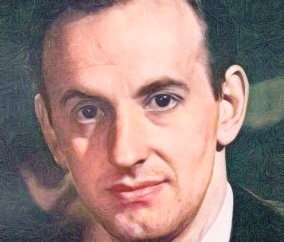
Michael Redington
‘My function,’ he says, ‘is to get all the ideas and work the suitable ones out in programme terms. Ideas come from within, from outside; some from me. All the time you have to keep the melting pot on the bubble. The aim is to open new vistas, new spheres...not only interpreting but keeping ahead of events. This applies whether we plan a travel film or a documentary on prison life or censorship.
After the idea, we've got to find a writer, to assemble the basic facts, then a researcher and a producer. Then we consider the manner in which the programme should be presented, and who's to be the figurehead to do it.’
Under Reddington, regarded as one of the best men in ITV, current affairs producers are allowed to devote more time and thought to programmes. Although Reddington is prepared to get a series together in 8-10 weeks, the Bredin-Morris documentary on Oxford took all of 3-4 months. Beyond this preparation period, Reddington argues, ideas take time to germinate and shape themselves.
At least 8 months went by before Braden's show developed into its present form. ‘One had to sense that satire was coming up.”
Alan Tarrant, Executive Producer of light entertainment, went through journalism, editing, play-writing and directing advertisement magazines, before turning to variety shows, a field in which he found his true genre. He agrees that light entertainment programming has changed. ‘We used to do a weekly variety programme and spectacular, besides Val Parnell’s Palladium show. Now we do one light entertainment show every six weeks.’
But it still comes to about 4 hours programming a week – with situation comedy shows such as Bud Flanagan’s forthcoming series, Arthur Haynes and Hancock, one the one hand, and light musical shows (Denegan, etc.) on the other. Tarrant produced the recent Hancock series and seemed pained at criticism based largely, he felt, on its being ‘a different Hancock.’ Towards the end of the series the press started to like it.
‘Letting executives produce helps to keep their hands in and never allows them to forget what a nerve-wracking business it is! But it has its hazards, too. If you do a bad show, you’re under fire all round, and in dead trouble from your own staff!’
One of Tarant's headaches is lack of good comedy writers. ‘We are always looking for them. Now for the first time, there seems to be more coming along.’ Charges that companies do not give them proper encouragement hurt. ‘How are you going to encourage the people who churn out masses of tripe I get on my desk? You should see some of it. You can only find new writers if you judge on the basis of work they actually produce. We encourage the promising ones, and give them fair criticism. The other day we commissioned a man’s third attempt. He’d taken the trouble to note our suggestions. I don’t know what else we can do. We have about sixty writers working for us under contract. We support the TV Writing School with 12 scholarships, which ought to yield potential newcomers.’
ATV’s best example of the new prototype producer who is something of a technician, lightingman, writer, stage manager, designer, director and producer is probably Quentin Lawrence. An engineer by training, he Joined ATV on the technical side via Harwell ae Pye, in the early days at Highbury, making high-definition films, and later turning to stage designing and brilliantly producing serials like Greifer’s The Voodoo Factor. Promoted to executive drama producer, he quit the post after six months to concentrate on producing plays, including some of the best Drama 63. In the last two years he has also made 3 feature films, including ‘The Man Who Finally Died’.
Among the younger, up-and-coming men with reputations already made, Francis Essex obviously stands out. Like Brian Tesler (now ARC’s programme controller) Essex started as a BRC trainee and (with Tesler again) is probably among the top six light entertainment producers in British TV. He decided at school to work in television, gained experience in rep and club theatre management, and was already classed as a star producer at 27. At the BBC he worked for a time under Bill Ward, who snapped him up at ATV where his often original and advanced ideas have found full scope.
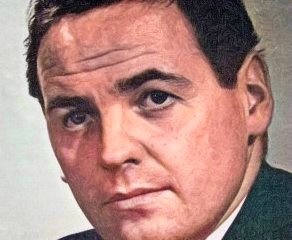
Francis Essex
Essex believes that a producer’s talent lies simply in making the ordinary seem extraordinary. He starts with an almost childlike delight in big name artists. “I have an enormous admiration for these top stars, and feel it’s one’s duty to present them at their best. It’s the easiest way to win their confidence. Then you can really become more adventurous. A producer has to have courage, nerve and a bit of cheek. Being original has its drawbacks. My most notable flop at the BBC was putting on a rival show to OH BOY. DIG THIS was adventurous but lost its audience after 13 weeks. DRUMBEAT followed. I thought that was appalling but it got the audience back.
‘It’s difficult to get something new into every show. If you work with people like Tommy Steele who is just as eager to try new ideas, has many of his own and is game for anything, TV can be exciting.’
One of his latest experiments was a show with artists singing live in Paris, with the orchestra playing in London and the choir somewhere else. ‘It was different.’ Another typical gimmick approach didn’t altogether come off. That was Star Time which coincided with Budget Day and suggested money as the central theme. ‘We decided to call it The Million Pound Show and looked for songs about money. Do you know there are about 60? We selected 26 and one followed the other. The sets featured money, too, blown-up.
‘Often someone has an idea and it sparks off something else in me. Window displays give me ideas for sets.’
Essex is a rarity at ATV: a bright young creative talent who’s been given his head and hasn’t been overloaded. There are probably only two or three others. The danger is not failing to discover potentially good directors/producers — a selection board attempts to do this — but in failing to make the best use of them once they’ve been discovered. Too many of the 40 or so directors/producers were tagged as bright, promising creative talents at one time or another. One always expected really exciting television from men like Dicky Leeman, Albert Locke. Tony Kearey, Hugh Rennie and several Others, but they’ve simply become more and more embroiled in the hard, relentless production grind, turning out fast, competent work, without ever quite matching early promise. They may create a new programme, or find themselves landed with one, but they are then stuck with it, perhaps for years, when they ought to be more effectively deployed creating more new programmes, working out fresh formats with new and established writers, trying out new actors and artists, experimenting with new methods of presentation and production techniques.
In too many cases creative skills have been under-employed, enthusiasms stilled in the perpetual battle to keep top-rating shows at the top.
There are writers who feel that this concentration on the production grind has had a deadening effect on their relationships with producers and on programmes. There was a time when the two used to get together in creative sessions to work out a story line, envisage a production, plan it together. Today ideas have to go through the script department — which has been known to turn down on the spot even well-established writers — and through script editors working on series. Direct contact between producer and writer has almost broken down, except in light entertainment and current affairs, and probably accounts for much of the ‘professional mediocrity’ in programmes.
This sapping of creative energies when they should be working full force to produce exciting television is probably not even realised by Lew Grade, who prides himself on ATV’s informal atmosphere and with knowing what’s going on. It’s a trend that, whoever succeeds Harold Jamieson when he shortly gives up his post as assistant productions controller, ought to bring to an abrupt end.
If it is the price that has to be paid for programme growth — indeed the continuing growth of the company as a whole — it suggests an organisational flaw that ought to come under the review currently being undertaken by Edward Roth, Lew’s new Deputy.
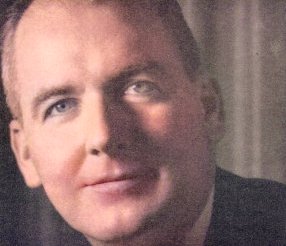
Edward Roth
Roth (ex Columbia, Boston and Harvard Universities and US Marine Corps) has spent the last few years opening television stations in places like Mexico, Peru and Ireland. He started out writing for radio, then turned to educational films and Paramount News, directing for NBC, stage management and back to writing ‘public service shows’. A sliding door divides his office from Lew Grade’s. He’s run every side of television, he told me, except the technical, but he wasn’t brought in to be a ‘hatchet man’. He is looking critically, if cautiously, at every facet of the organisation ‘to increase efficiency, bring about economies’.
With curbed profits, some budget clipping seems inevitable. ‘There’ll be no sudden changes, though I can see some scope. I only came here in January, so I have to operate cautiously’. To meet ‘everybody’, he’s holding a series of informal dinner parties. What has impressed him, he says, is the high calibre of the young executives working as assistants to most of the heads of departments: Engineering, Operations, Sales.
No-one at ATV pretends to know exactly what will happen after July 1964, except that no further contractual commitments are to be made beyond that date. Meanwhile — perhaps to strengthen Sir Robert Renwick’s hand in the battle to stave off the worst — no chances are being taken. Mid-Atlantic programmes are virtually out, except for a few stock items like The Cheaters. The only new Mid-Atlantic series is the ambitious Espionage. “Let the BBC buy all the old American films, Westerns and documentaries they want’’, Lew Grade points out with the missionary zeal of a late reformer. ““We are not even buying American documentaries at about a tenth of the price it costs us to make them. We’d rather show the British product.”
Shortly after this article was written, ATV announced a new drama policy to give writers a bigger part in the production of their plays: ATV have collected a special group of writers and directors under the Executive Producer, Stuart Burge, who will work in close collaboration than before, in an effort to improve production standards. The writers involved are Nigel Kneale, Clive Exton, Stanley Mann, Giles Cooper, Ken Taylor, Keith Waterhouse and Willis Hall; the directors Michael Elliott, William T. Kotcheff, Silvio Narrizzano, Donald McWhinnie and David Green.
The ITV Story Part 7 - The New Franchises
Aticle: Wilfred Altman (1963)
